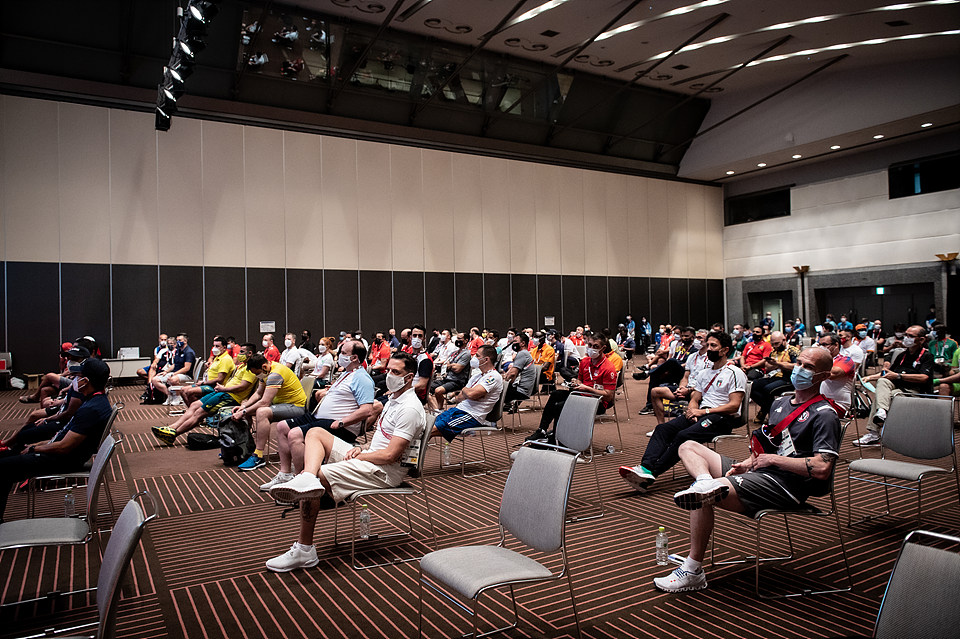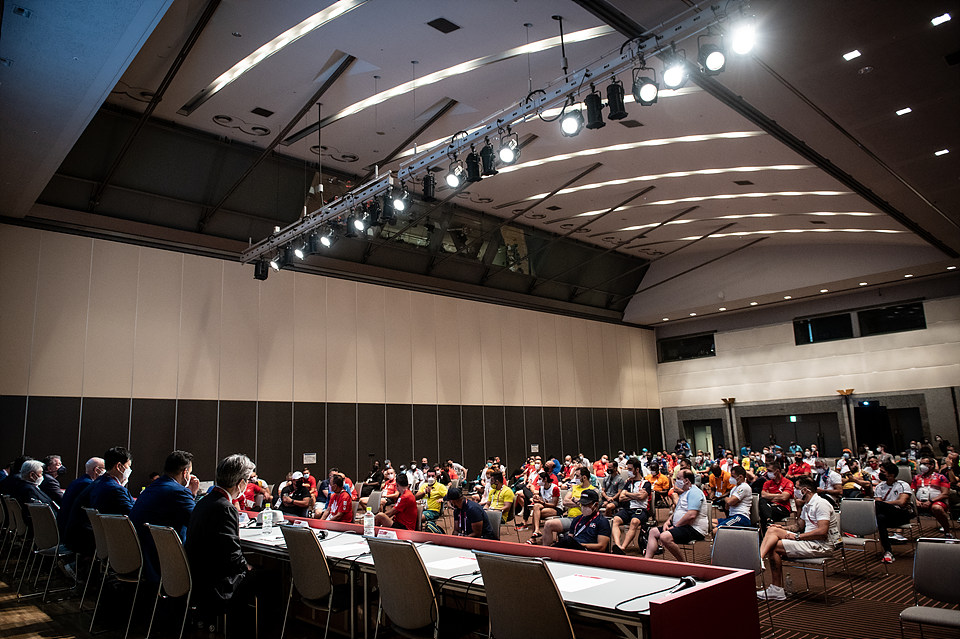
Tokyo 2020 is a landmark event in mankind’s fight back against the virus – and the World Taekwondo family is proud to be part of it
CHIBA, Japan (July 23, 2021) – Taekwondo has adapted to Covid-19, learned the necessary lessons, and in Chiba on Saturday, its athletes will charge out of the gates kicking with a force that has been pent up since the pandemic began.
That was the message delivered by coaches and officials who attended the Head of Teams Meeting at the International Conference Hall attached to the Makuhari Messe Hall stadium – the venue for the Taekwondo competition at Tokyo 2020.
Members of the World Taekwondo family recalled the struggles they had endured in 2020, their dismay at the news that the Olympics was delayed, and how they kept their athletes’ motivation up in those dark months.
Deep appreciation was conveyed toward the IOC, and towards the Japanese government and people, for holding these Olympics amid such challenging circumstances.
And a few even saw some upside, in terms of lessons learned from the novel coronavirus pandemic that turned the world upside down.
Surviving the Pandemic, Preparing for the Olympics
“In 2020, there was nothing – nothing!” recalled Musfata Cam of Turkey. “All the Taekwondo schools were closed - training was forbidden.”
“2020 was a disaster at the sport level, we could not travel, nothing went through,” added Karim Dighou, Australia coach. “Keeping everyone motivated was a challenge.”
Central to that challenge were the lockdowns applied in some many regions, cities and even countries.
“During lockdown, we did online training,” Dighou added. “But high performance athletes and lockdown do not go together!”
A core aspect of coaching and athlete preparation is intelligence gathering and drawing up fight plans. That means reviewing competitors: Their techniques, their tactics, their strong points, their weak points. Given the lack of recent competitive activity, much of this pre-planning was impossible.
This raises an obvious question: Are the teams ready for this Olympics?
“I don’t know if we are 100% ready,” admitted Cam. “But all teams are the same.”
Sport always has the capacity to surprise: underdogs can defeat customary victors, favorites can be toppled by unknowns. This year there could be more upsets than ever before - and that is not a bad thing.
“Nobody knows what will happen,” said Cam. “But that is the spirit of the Olympics!”
“It is going to be challenging,” added Juan Moreno, a Florida-based coach who is this year coaching Mexico. “But everyone is in the same boat.”
Lost Years
Many – perhaps all – Taekwondo Olympians were dismayed to hear the news that Tokyo 2020 had been delayed for a year.
“A lot of people don’t realize the sacrifices in time and energy made by the athletes,” said Jae Park of Canada. “They put their lives on hold for three or four years, some for 10-12 years, to get here.”
“We lost, basically, two years,” said Moreno, referring to the competition schedule that was killed for 2020 and for most of 2021. “This means that junior athletes missed almost all of their junior careers.”
As Covid continued its 2020 rampage into 2021, fears arose that the event would be cancelled outright. “We thought Japan would be too afraid to hold the Games,” said Cam.
That possibility would have wiped out the work of years.
“For four years, we had worked really hard for this Olympics,” said Seyed Poldegar, team head of Iran.
‘Thank you, Japan’
To cancel the Olympics would have been a crushing, soul-destroying blow to young athletes who - in their short careers - may only have three, two or oven one single Olympic shot.
But looked at from the perspective of the IOC and the government of Japan, the tasks and risks they faced were enormous.
For any country, hosting an Olympics represents an awesome national undertaking. To host an Olympics during an unprecedented global pandemic added a colossal new layer of extra budget, planning and risk management.
A whole new range of systems would have to be created, implemented and integrated across the platforms of both the IOC and the Japanese government. Yet, this challenge was surmounted.
When the appropriate authorities green-lighted the Games for this year, the World Taekwondo family breathed a long sigh of relief.
“I want to say ‘Thank you’ to the prime minister of Japan,” said Cam. “He made a difficult decision, but we appreciate it.”
At ground zero, the staff deployed at the venues – from officials to volunteers to Self Defense Force personnel – are winning World Taekwondo’s heart in a big way.
“The volunteers have all left their lives, their jobs, their families – for us!” said WT Technical Representative Philippe Bouedo.
“I think the Japanese have done a fabulous job so far - they are so polite, so helpful, I have never been around a culture like this,” said Moreno. “This is my eighth Olympics, but this is another level - 100% top level.”
“’Thank you, Japanese people!’” added Poldegar. “The Japanese people are very, very good at hospitality.”
The Upside in the Downside
Despite the horrors there have been some positives to the pandemic.
The break from an intense competitive schedule granted many players the chance to heal long-term injuries, while working on sustainable fitness and polishing fight technique.
“I told everyone that it was time to grow and have fun,” said Moreno. “This down time was unprecedented for the athletes as there are [usually] so many events.”
The pandemic did not only grant athletes and coaches the time to deal with long-term issues; it also forced sporting officials to find ways to overcome restrictions, such as the inability to travel internationally or gather in groups.
One solution was to take up or increase the use of convenient, cross-border digital technologies. The habits formed will likely outlive the pandemic.
“Covid was a curse, but on the other hand, it was a blessing,” said WT Secretary General Hoss Rafaty. “It taught us to be more efficient, more sustainable, more environmentally friendly - so many positives have come out of it.”
Others took a more philosophical view of the Covid challenge.
“Humans are always fighting,” said WT Council Member Dejun Sun. “But this is a fight we should win together – the fight against this virus.”
Some expressed a near disbelief that the humanity had summoned the courage to hurl down the gauntlet to Covid-19 by going ahead with the Games.
“Sport proves that we can beat this virus,” said Coach Faris Alassef of Jordan. “It is so good to be here – and so weird.”
“It’s amazing to be here,” added Canada’s Park. “It is just amazing that this is actually happening.”
Though the global carnival spirt of the Olympics is necessarily absent at Tokyo 2020, a sense is already growing that this great global event will become a historic landmark in mankind’s struggle against Covid-19.
For those who have gathered here, it will be something to tell children and grandchildren about in the years and decades ahead.
“This situation cannot go on forever and we would all regret it if we did not hold these Olympics,” said Australia’s Dighou. “We are here! And we are definitely going to have a great Games.”
